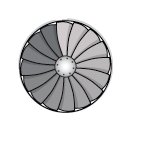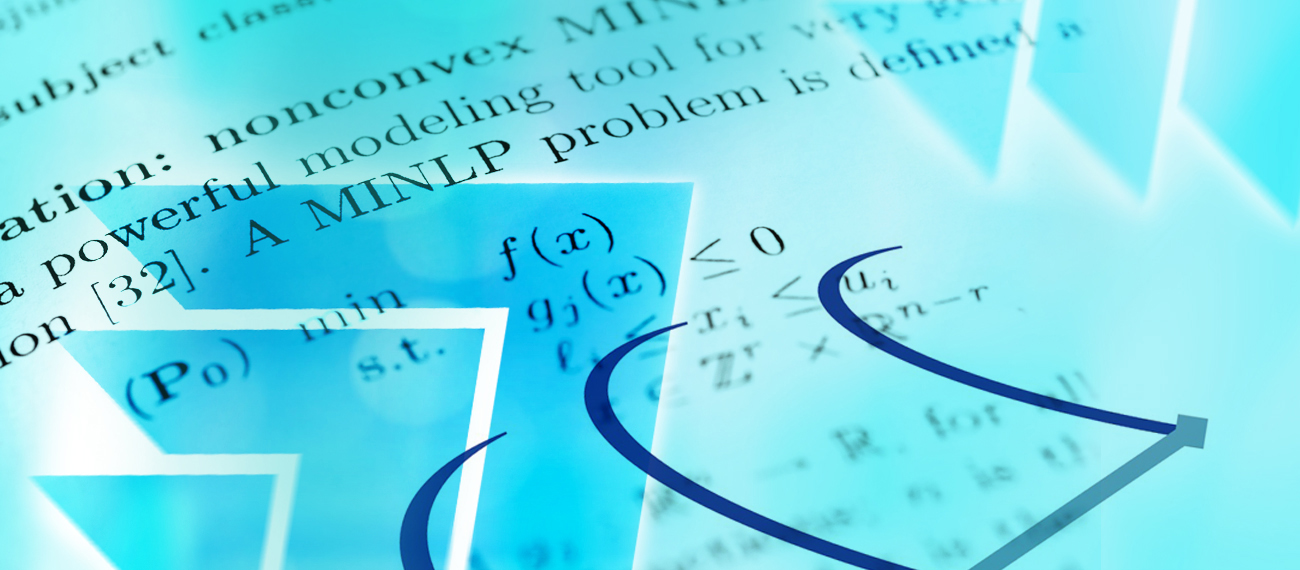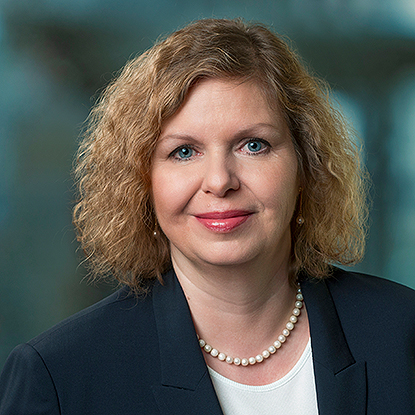Former Projects
Optimization with Complementarity Constraints
Complementarity constraints require that at most one of two variables is nonzero. In discrete optimization, complementarity constraints have an important significance for the modeling of logical relations. With their help one can express that from a set of possible events not more than one is allowed to occur. The applications of such relations are abundant, e.g., in machine learning, communication systems, capital budgeting or scheduling. The aim of this project, is to develop a branch-and-cut algorithm for complementarity constrained optimization problems, including presolving techniques, branching rules, primal heuristics and cutting planes. The implemented software has to deal with problem instances involving large data in a robust manner. Furthermore, it should recognize and exploit special structures of a given problem instance automatically. As a tool, we use the software SCIP which provides a framework for solving discrete and combinatorial optimization problems. The purpose is to include further components to SCIP and to make them freely available for academic use.
Duartion: 12/2012-11/2015
Contact: Tobias Fischer, Marc Pfetsch
Multilevel Methods for PDE-constrained Optimization with State Constraints
We extend the adaptive multilevel SQP-method for control-constrained optimal control problems of Ziems and Ulbrich to state-constrained optimal control problems. To this end, we combine the Moreau Yosida regularization with the adaptive SQP method. The refinement conditions and the penalty parameter update are modified specifically. Based on the convergence theory for the Moreau Yosida regularization and the adaptive SQP method we deliver new convergence results for the output of the multilevel SQP method for state constraints. In order to reduce the computational effort we include a reduced-order model based on POD. We apply this theory to flow control problems.
Contact: Stefanie Bott, Stefan Ulbrich, Michael Schäfer
Optimal Flow Control based on Reduced Models
The aim of this research project is to explore the possibility of developing POD-based reduced-order models for active control of fluid flows governed by the Navier-Stokes equations. In particular, we consider the cancellation of Tollmien-Schlichting waves in the boundary layer of a flat plate by plasma actuators. By optimal control of the plasma actuator parameters it is possible to reduce or even cancel the Tollmien-Schlichting waves. The optimization is performed within the reduced system with a Model Predictive Control (MPC) approach.
Contact: Jane Ghighlieri, Stefan Ulbrich, Michael Schäfer
Multilevel methods for the optimization of fluid-structure interaction problems based on adaptive discretizations and reduced order models
Many problems arising in engineering applications (aerodynamics, civil engineering,…) involve the interaction of fluid flows with the elastic deformation of structures. While the numerical simulation of fluid-structure-interaction (FSI) problems is nowadays quite well understood, the efficient optimization of such problems with derivative based optimization methods is still in its beginning. On the one hand the Eulerian-Lagrangian-coupling of fluid and structure makes the derivation, analytical foundation and numerical implementation of adjoint-based techniques for the derivative computation involved. Moreover, rigorous analytical existence and uniqueness results for FSI-problems are even in 2D limited. On the other hand, the computational complexity of FSI-problems requires highly efficient optimization methods in order to solve optimization problems with reasonable effort.
The aim of this project was the extension of adaptive multilevel optimization techniques based on adaptive discretization, reduced order models and error estimation, which have been developed in the group of the supervisor, to the optimization of FSI-problems. This includes the development of the optimization method including error control criteria, the construction of suitable reduced order models and the convergence analysis under suitable assumptions. Moreover, the algorithm shall be implemented based on existing codes of the working group and be tested on demonstrator problems. The work builds on previous/current work of Sarah Essert within GSC CE, who has derived and implemented adjoint-based derivative computations for FSI-problems.
Kontakt:Johanna Biehl, Stefan Ulbrich
Optimization of Energy Systems for Settlements Involving Renewable Energies
Kontakt:Kristina Goschin, Stefan Ulbrich
AdRIA (Adaptronik-Research, Innovation, Application)
Adaptronics is an interdisciplinary science dealing with mechanical structures which adjust autonomously to changing conditions. In order to realize such adaptive structures, actuator and sensor systems as well as real-time-capable controllers are developed. Adaptive structures have many possible fields of application among them active vibration control.
Duration:2008-2016
Contact: Carsten Schäfer, Stefan Ulbrich
Cocoon: Mixed-Integer Nonlinear Models in Wireless Networks
In this project we explore the utilization of mixed-integer optimization in wireless telecommunication networks. Typical for problems occurring in this context is the simultaneous consideration of continuous optimization variables, e.g., like beamforming vectors and combinatorial aspects, e.g., like the assignment of base stations to mobile users. Mathematical models are derived that account both for the requirements of the application and the solvability. Usually one has to deal with NP-hard problems in this context that cannot be solved by standard software. We investigate convex approximations as well as heuristics to derive reasonable good solutions. We use these approximations as well as techniques like cutting plane generation aiming to solve the mixed integer nonlinear model of the original problem. The global optimal solution can then also be used to evaluate heuristic and approximation approaches.
Duration:2011-2014
Contact: Anne Philipp, Stefan Ulbrich
Research Cooperation Network Optimization
ForNe is an industry coorperation project concerned with long-term planning of gas networks.
Duration: Jul 01 2009 – Mar 31 2014
Contact: Imke Joormann, Marc Pfetsch
Project partners:
Analysis of Sparse Solutions of Underdetermined Linear Equation Systems
This research project deals with the problem to recover a sparse solution of an underdetermined linear (equality) system. This topic has many applications and is a very active research area. It is located at the border between analysis and combinatorial optimization. The main goal of our project is to obtain a better understanding of the conditions under which (efficiently) finding such a sparse solution, i.e., recovery, is possible. Our project is characterized by both theoretical and computational aspects as well as the interplay of continuous and discrete methods.
Duration: Apr 01 2011 – Jun 30 2013
Contact: Andreas Tillmann, Marc Pfetsch
This project is part of the BMWi project “Investigation of the technical capacities of gas networks”, in which six research partners and one gas transportation company are involved. The technical capacities determine the upper bounds on the amount of gas that can be charged into or discharged from a gas network, which limit the revenue of a gas transportation company. Therefore, a central aspect is to compute the technical capacities.
In our sub-project, we want to determine so-called certificates for the infeasibility of certain gas nominations. For the analysis of technical capacities one has to decide which requests can be handled by the network. If a certain nomination cannot be transported, one wants to know the reason why this nomination is infeasible. Thus a justification is required, i.e., a certificate that is easy to understand. This should be possible without the need for involved simulations or computations. We will concentrate on the development of methods to find such certificates and apply them to the analysis of technical capacities.
Contact: Imke Joormann,Marc Pfetsch
Duration: Jul 01 2009 – Jun 30 2012
Project partners:
Advanced Numerical Methods for PDE Constrained Optimization with Application to Optimal Design and Control of a Racing Yacht in the America's Cup
The goal of this project is the development, analysis, and implementation of robust and efficient optimization algorithms for the optimal design and control of a racing yacht competing in the America's Cup. The project focuses on the optimization of the hull-keel-winglet configuration toward drag minimization. This involves optimization problems including very complex and highly coupled systems of PDE constraints.
The main research topics of the project are:
- Multilevel optimization methods based on inexact trust-region SQP techniques using a hierarchy of adaptive discretizations or models.
- Semismooth Newton and interior point methods to handle inequality constraints for design and state variables.
- Adaptivity in time and space based on the goal oriented approach and including the issue of inequality constraints.
- Parallel processing for the optimization schemes via space and time domain decomposition.
Duration: 2006-2011
Contact: Christian Brandenburg, Stefan Ulbrich
Optimal Control of Switched Networks for Nonlinear Hyperbolic Conservation Laws
The aim of this project is the analytical study of optimal control problems for networks of nonlinear hyperbolic conservation laws under modal switching. Networks of this type arise for example in traffic flow models where the switching is considered in the coupling conditions at the nodes. Since entropy solutions of conservation laws may develop shocks, the analysis quite is difficult. Switching, for example introduced by traffic lights, may lead to additional discontinuities in the solution.
Duration: 2009-2014
Contact: Sebastian Pfaff, Stefan Ulbrich
Adaptive Multilevel SQP-Methods for PDAE-Constrained Optimization with Restrictions on Control and State. Theory and Applications
The aim of this project is to develop, analyze and apply highly efficient optimization methods for optimal control problems with control- and state-constraints governed by time-dependent PDAEs. We combine in a modular way modern space-time adaptive multilevel finite elements methods with linearly implicit time integrators of higher order for time-dependent PDAEs and modern multilevel optimization techniques. The aim is to reduce the computational costs for the optimization process to the costs of only a few state solves. This can only be achieved by controlling the accuracy of the PDAE state solver and adjoint solver adaptively in such a way that most of the optimization iterations are performed on comparably cheap discretizations of the PDAE. We will focus on two exemplary applications.
Duration: 2006-2014
Contact: Jan Carsten Ziems, Stefan Ulbrich

Subproject D5: Efficient Numerical Multilevel-Methods for Optimization of Gas Turbine Combustion Chambers
In modern gas turbine combustion chambers, there are still many different aspects that are not fully understood.
The CRC 568 was founded to make fundamental progress in this field of research. The main focus lies on the simulation of the flow and combustion that are important for the understanding of the different phenomena.
Even though the simulation itself is a challenging task, in this project we aim for the optimization of the combustion chamber with respect to various variables including the geometry. To match this purpose, we try to apply and develop mathematical techniques that make optimization applicable.
Duration: 2008-2011
Contact: Rolf Roth, Stefan Ulbrich

The Collaborative Research Centre 666 develops methods, processes and facilities with the aid of which branched structures in integral sheet metal construction can be optimized with regard to their function and stress. The research activities are aimed at new methods of developing multifunctional products and completely new manufacturing possibilities. In the area of product development, new methods of algorithmic product development involving mathematical optimization and graph theory are being developed.
Subproject A02: Mathematical models and algorithms for an automated product development of branched sheet metal products
The aim of subproject A02 is to combine experience-based product development and mathematical optimization techniques with regard to automated product development of branched sheet metal structures in order to increase the degree of automation within product development and to offer the designer a decision-making aid. For this purpose, the descriptions of the constructive components are to be formulated as optimization problems and efficient solution methods for automated product development are to be designed.
Duration: 07/2005-06/2017 (Phases I-III)
Contact: Thea Göllner, Ute Günther, Wolfgang Hess,Benjamin Horn, Hendrik Lüthen,Stefan Ulbrich, Marc Pfetsch
Subproject A06: Simulation-based optimization methods for the deep drawing of branched structures
In this subproject, numerical methods for the optimization of the deep drawing processes of sheet stringers are developed. Based on a finite element simulation of the deep drawing process, selected process parameters, such as blank holder forces and fluid pressure in hydroforming, locking forces in the flange area, shall be optimized subject to constraints of strains and buckling stresses with respect to a given objective function, e.g., maximal material flow or position of sheet stringer.
Duration: 07/2009-06/2017 (Phases II-III)
Contact: Daniela Bratzke,Stefan Ulbrich, Anna Walter
Subproject A3: Robust Optimization of Load Carrying Systems in Mechanical Engineering
The presence of uncertainty is a prevalent subject in mechanical engineering which can lead to severe economical and safety consequences. The aim of this project is to find -for load-bearing mechanical systems- the optimal robust design regarding uncertainty of parameters (material properties, loading szenarios, etc.) as well as uncertainty of the manufacturing quality. To this end we use simulation-based optimization of geometry, topology and the placement of piezoelectric actuators, whereat we want to apply and extend modern robust optimization techniques.
Contact: Stefan Ulbrich, Alexander Matei
Former: Philip Kolvenbach, Adrian Sichau
Subproject A4: Mathematical Models and Methods for Optimal Combinations of Passive and Active Components
Trusses are one of the most commonly used structures in mechanical engineering. Truss structures are used, for example, within bridges, cranes or transmission towers. In practice they are often over-dimensioned to withstand given forces under uncertainty including unknown loadings or material properties. This project focuses on robust topology optimization and the optimal placement of active elements to cope with uncertainty. Such elements are developed within CRC 805 and can react on these uncertain effects to reduce the dimension of the trusses. Mathematically, the topology optimization and optimal placement of active elements under uncertainty lead to mixed-integer (nonlinear) semidefinite programming problems.
Contact: Marc Pfetsch, Stefan Ulbrich
Former: Tristan Gally, Kai Habermehl, Anja Kuttich, Sonja Mars
Subproject A9: Resilient Design
In this new project, optimization methods for the optimal design of technical systems under uncertainty will be developed. The goal is to find an optimal combination of different components constituting a resilient system structure. The development of problem-specific models and mathematical optimization techniques for the solution of the resulting mixed-integer nonlinear optimization problems is essential.
Contact: Marc Pfetsch, Andreas Schmitt
Subproject B1: Optimization of Process Chains under Uncertainty
The aim of this subproject is to control uncertainty in process chains using mathematical models and to develop optimization procedures in order to maximize the value of process chains. Uncertainty in the production of components emerges from random variations in the raw material, from unpredictable process behavior or because the customer's use can only be vaguely predicted. The optimization procedures are based on quantified (mixed-integer) linear programs.
Duration: 01/2009-12/2016 (Phases I-II)
Contact: Thorsten Ederer, Marc Pfetsch


